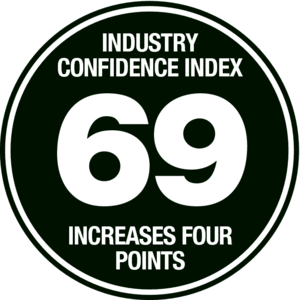
It has not been an easy five years for the construction industry. The recession of 2008 hit nearly every market sector and region in the country. Recovery has been slow. For years, forecasters have searched in vain for signs that the worst of the recession is in the rearview mirror.
The most recent ENR Construction Industry Confidence Index survey may be that sign. It shows the industry believes the market has turned a corner and is beginning, in fits and starts, to recover in a broad way. The second-quarter 2013 CICI rose to a record 69 points on a scale of 100, which represents a growing market. The vast majority of the 310 executives of large construction and design firms responding to the survey believe the market has stabilized. Only 11% believe the market is currently in decline, while 46% believe it is growing.
The CICI measures executive sentiment about the current market and reflects their views on where it will be in the next three to six months and over a 12- to 18-month period. The index is based on responses to surveys sent out to more than 3,000 U.S. firms on ENR's lists of the leading contractors, subcontractors and design firms. The latest results are based on a survey conducted from May 30 to June 10.
More significant than their optimism about the industry in general, the surveyed industry executives believe virtually all the market sectors measured by the CICI are now in growth mode. For the CICI survey, execs were asked to assess current and future market prospects in general and any of 15 market sectors in which they currently work. For 14 of the survey's 15 markets, more executives saw growth in their particular market sector than those in the same sector saw decline. Further, the one exception—the environmental market—has execs evenly split on whether it is growing or declining. However, current confidence levels are now high in all 15 market sectors measured by the CICI survey.
Another positive sign is that, for the first time, all market sectors had a CICI rating over 50, indicating expected market growth over the next 18 months. Multi-unit residential ranked as the highest-rated market, with a CICI rating of 79, followed by petroleum at 77; the power market and the hospital and health-care market tied at 67. Executives ranked the environmental market as the weakest, with a CICI rating of 53.
Recovery Seen as Fragile
The CICI findings are in contrast to the soon-to-be-released results of the latest Confindex survey from the Construction Financial Management Association, Princeton, N.J. CFMA polls 200 CFOs from general contractors, subcontractors and civil contractors. While a Confindex rating of 100 indicates a stable market, higher ratings show growth is expected.
"Our Confindex declined to 128 from 129 [on a scale of 200] for the second quarter," says Stuart Binstock, CEO of CFMA. He notes that the four components comprising the Confindex were mixed in the second quarter. The current "business conditions" component of the Confindex fell to 144 from 147, while the "outlook for the year ahead" component fell two points, to 137. However, the "current financial conditions" component rose one point, to 116, and the "current market confidence" component was flat, at 121, Binstock notes.
Binstock says there is a divide between those CFMA members that are doing well working primarily in the private sector and those that are struggling working mostly in the public sector. "There seems to be a growing gap between the haves and the have-nots, depending on what sector you are focused on," he says.
One reason the CFMA Confindex sagged this quarter is that, in the first quarter, hopes were so high that 2013 would be a strong growth year. "There is a perception that the market, while growing, is not growing as fast as expected," says Anirban Basu, CEO of economic consultant Sage Policy Group Inc., Baltimore, and CFMA economic adviser.
Basu says many CFMA members worry the market recovery is "fragile." He says federal budget sequestration has begun to have an effect on the public-sector market and that CFMA members think there is a lack of policy commitment to infrastructure by government.
Basu also notes that CFMA members worry about operational costs affecting contractor finances. Among these financial concerns are the potential costs of the Affordable Care Act and materials price volatility. "There has not been a sudden burst of pessimism among our members, but there is a growing sense of unease that something could happen to the market," Basu says.
The concerns about materials prices also are reflected in the CICI survey. When asked if there has been upward pressure on materials prices in the past six months, 69% said there has been. Steel and copper continue to figure prominently in respondents' worries about price spikes, but now lumber, gypsum and drywall, and concrete prices also are mentioned by many as cause for concern.
The CICI survey also asked construction executives if their clients' access to capital for project financing has improved or gotten worse in the past six months. In the second quarter, 37.7% said project financing was somewhat easier or much easier that it was six months ago, up from 31.9% in the first quarter and only 19.9% in the fourth quarter of 2012. Only 9.7% said project financing was tougher to come by in the second quarter.
ENR subscribers can see the entire package of reports here.


Post a comment to this article
Report Abusive Comment